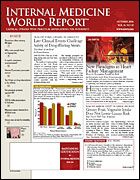Publication
Article
The Higher the Vitamin D Intake, the Lower the Risk of Pancreatic Cancer
Author(s):
Role of Dietary Sources, Vitamin Supplementation Confirmed
People taking high daily doses of vitamin D, by diet and vitamin supplementation, may be cutting their risks for pancreatic cancer by about 41% compared with consuming low amounts of the vitamin.
Researchers have long suspected an association between vitamin D and certain cancers, since ecologic studies have found lower rates of colon, breast, and prostate cancer among populations exposed to high amounts of sunlight, and who thus had ample opportunities for UV irradiation to create vitamin D in their skin.
However, in areas where sunlight exposure is more limited, such as the United States, most vitamin D is obtained by eating fortified dairy products and breakfast cereal.
Now for the first time, a large epidemiologic study has found that dietary and supplemental vitamin D can also influence the risk of pancreatic cancer (Cancer Epidemiol Biomarkers Prev. 2006;15:1688-1695).
The study included 2 US cohorts from ongoing studies: 46,771 men aged 50 to 75 years when the Health Professionals Follow-up Study began in 1986 and 75,427 women aged 38 to 65 years when the Nurses' Health Study (NHS) began in 1984.
Based on analysis of food-frequency questionnaires and self-reported multivitamin use, participants were divided into 5 groups according to their total daily vitamin D intake. About 95% of those in the highest category of vitamin D intake (≥600 IU/d) also took multivitamins.
During 16 years of follow-up, 365 new cases of pancreatic cancer were diagnosed. A strong inverse association was found between vitamin D intake and risk of pancreatic cancer (Table), after adjusting for confounding variables and even after excluding multivitamin supplement users.
Since baseline data revealed a consistent relationship between vitamin D, calcium, and retinol intakes, investigators conducted additional analysis.
Daily calcium intake also demonstrated an inverse correlation with pancreatic cancer risk, particularly among women in the NHS cohort. But this relationship significantly weakened after adjusting for vitamin D intake.
For retinol, higher intake was associated with lower pancreatic cancer risk among men but not among women. Again, once vitamin D intake was accounted for, the inverse correlation in men became far less significant. ?
"In concert with laboratory demonstrations of antitumor effects of vitamin D, our results point to a potential role for the vitamin D pathway in the prevention and pathogenesis of pancreatic cancer," Halcyon G. Skinner, PhD, MPH, of the Feinberg School of Medicine, Northwestern University, Chicago, and colleagues conclude.






